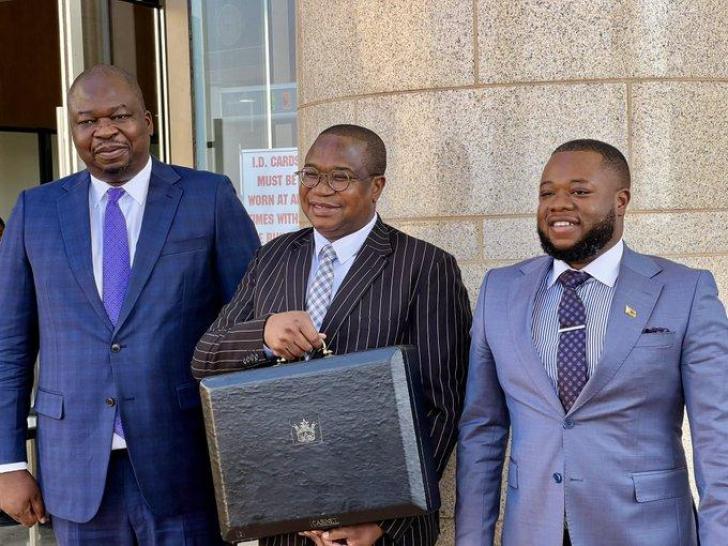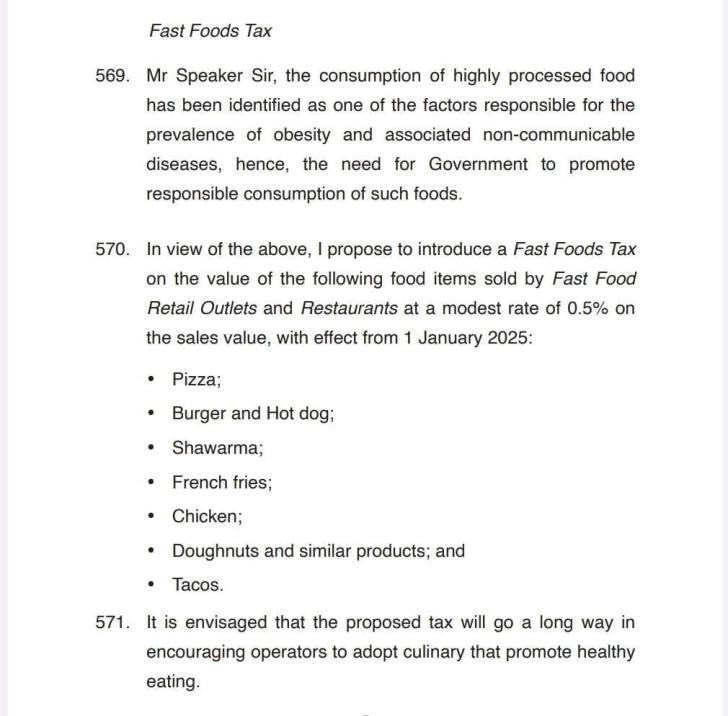News / National
Zimbabwe introduces taxes on pizza, burgers, fries
28 Nov 2024 at 16:17hrs |
1 Views

Finance Minister Mthuli Ncube has announced a new 0.5% tax on fast foods and a 10% withholding tax on sports betting winnings, set to take effect on January 1, 2025. The measures, unveiled during the 2025 National Budget presentation at the New Parliament in Mt Hampden, aim to broaden the government’s tax base and promote healthier eating habits.
Fast Foods Tax

The 0.5% tax will apply to the sales value of selected fast food items, including pizza, burgers and hot dogs, shawarma, french fries, tacos, chicken, doughnuts and similar products.
Minister Ncube stated that the new tax is designed to encourage fast food operators to adopt healthier cooking practices and to promote better eating habits among consumers.
"I propose to introduce a Fast Foods Tax on the value of the following food items sold by Fast Food Retail Outlets and Restaurants at a modest rate of 0.5%, with effect from 1 January 2025," Ncube said.
Tax on Sports Betting Winnings
In addition to the fast foods tax, Ncube announced a 10% withholding tax on gross winnings for sports betting punters. He explained that sports betting winnings are currently not subject to personal income tax, and the new levy is intended to include punters in the tax base.
"Sports betting punters currently receive income from winnings, which is not taxable under Personal Income Tax. To include punters in the tax base, I propose to introduce a 10% withholding tax on gross winnings, effective 1 January," Ncube added.
Economic and Social Implications
Since taking office in 2017, Ncube has introduced several contentious taxes, including the 2% Intermediated Money Transfer Tax (IMTT), which has been criticized for burdening already struggling citizens. While the fast foods and betting taxes aim to diversify revenue streams, they add to the financial strain on consumers and businesses.
Critics warn that over-taxation can have far-reaching consequences, including reduced consumer spending, decreased business investment, and slower economic growth. Some argue that excessive reliance on taxes may also lead to inefficient public spending and fiscal mismanagement.
As Zimbabwe grapples with economic challenges, the new taxes are likely to spark debates about the balance between raising revenue and fostering economic growth.
Fast Foods Tax

The 0.5% tax will apply to the sales value of selected fast food items, including pizza, burgers and hot dogs, shawarma, french fries, tacos, chicken, doughnuts and similar products.
Minister Ncube stated that the new tax is designed to encourage fast food operators to adopt healthier cooking practices and to promote better eating habits among consumers.
"I propose to introduce a Fast Foods Tax on the value of the following food items sold by Fast Food Retail Outlets and Restaurants at a modest rate of 0.5%, with effect from 1 January 2025," Ncube said.
Tax on Sports Betting Winnings
In addition to the fast foods tax, Ncube announced a 10% withholding tax on gross winnings for sports betting punters. He explained that sports betting winnings are currently not subject to personal income tax, and the new levy is intended to include punters in the tax base.
"Sports betting punters currently receive income from winnings, which is not taxable under Personal Income Tax. To include punters in the tax base, I propose to introduce a 10% withholding tax on gross winnings, effective 1 January," Ncube added.
Economic and Social Implications
Since taking office in 2017, Ncube has introduced several contentious taxes, including the 2% Intermediated Money Transfer Tax (IMTT), which has been criticized for burdening already struggling citizens. While the fast foods and betting taxes aim to diversify revenue streams, they add to the financial strain on consumers and businesses.
Critics warn that over-taxation can have far-reaching consequences, including reduced consumer spending, decreased business investment, and slower economic growth. Some argue that excessive reliance on taxes may also lead to inefficient public spending and fiscal mismanagement.
As Zimbabwe grapples with economic challenges, the new taxes are likely to spark debates about the balance between raising revenue and fostering economic growth.
Source - pindula
Join the discussion
Loading comments…










































